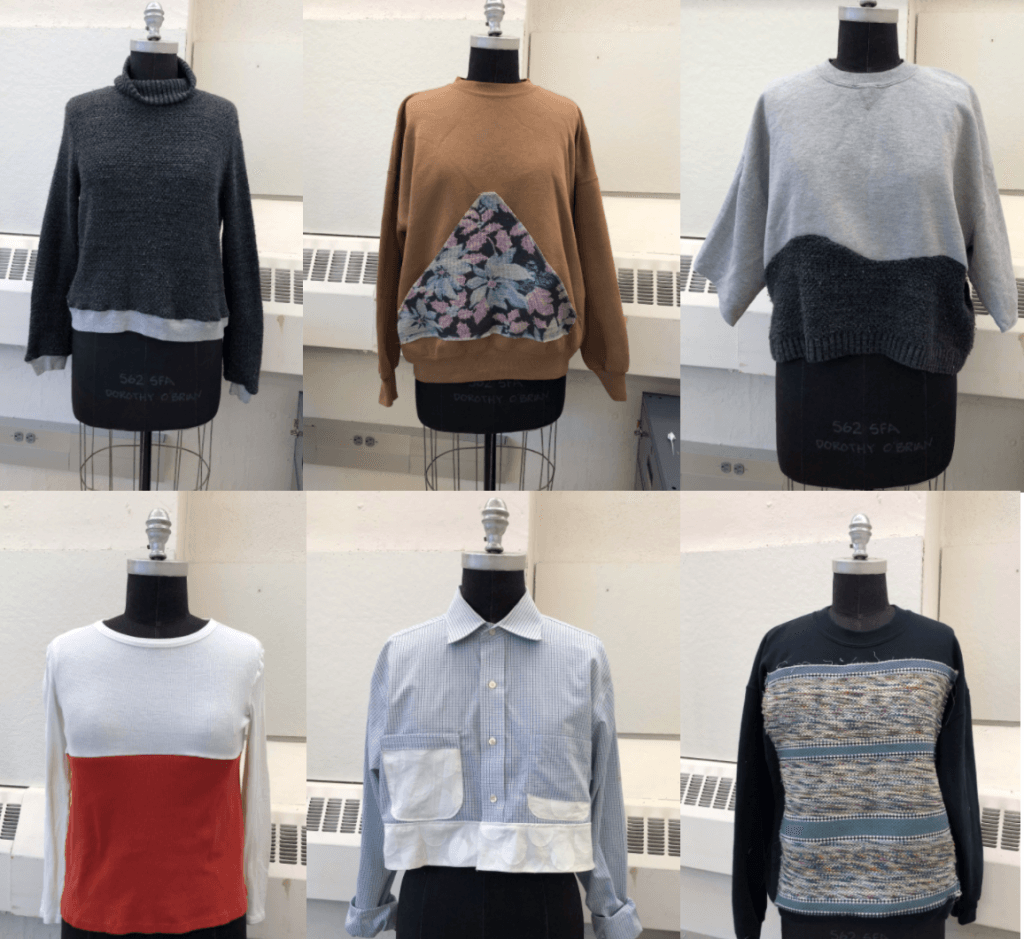The Office of Sustainability is happy to feature an article by SWAP (Sharing With A Purpose), the only nonprofit student business at Washington University. Eva Blumenfeld, Director of Marketing tell us about WUpcycle, a new program aiming at recovering “unwearable” clothes and turning them into unique and creative pieces of fashion.
Upcycle: Transform Waste into Value
1,800 gallons of water. That’s how much it takes to grow the cotton needed for one new pair of jeans. These stats have become increasingly motivating for the community of Sharing with a Purpose (SWAP) to spread their value of a circular or sharing economy, especially when it comes to textiles.
This past summer, Senior owner of SWAP, Eva Blumenfeld discovered a small store in Valparaiso, Chile full of something called “Upcycled Clothing”. Upcycling, as opposed to recycling is “to process (used goods or waste material) so as to produce something that is often better than the original” (dictionary.com).
This apparel came from textiles that were perhaps stained, ripped or otherwise deemed unwearable. In reality, when something is in this “unwearable” state, it probably just needs some extra special care. It definitely doesn’t want to end up in landfill that’s for sure, let’s not forget about those 1,800 gallons. The result of the process is one-of-a-kind repaired fashions that have been rescued, recycled and repurposed in a creative way. This idea is not particularly new, with efforts like “Urban Renewal”, the trendiness of “Sustainable Fashion”, “Zero Waste Daniel” and the overall appeal and hipster-ness of shopping at thrift shops. Yet it wasn’t something that existed in a developed way for the WashU community until this year.
Combat the “garbage mentality”
For the past four years, Blumenfeld has seen physical tons of clothing flowing in and out of the SWAP’s storefront on the South 40. Most of this clothing is in great condition and gets signed out almost immediately by SWAP shoppers. At the same time, there is a percentage of materials donated that easily fall into this “unwearable” category. Here’s where the “garbage mentality” of WashU students comes in.
Take the story of Gabby and the Patagonia fleece. One day, as Eva was going through SWAP’s typical donation load she comes across a nice fleece with a couple of little holes by the pocket. “Why would anyone donate this?” She thought, Patagonia is a nice brand, these fleeces typically retail for about $100-$150 and it seemed so easily repairable (couple of cross stiches and boom, good as new). Also, Patagonia happens to be one of those companies that has an INCREDIBLE value for sustainability and commits to repairing their apparel for the lifetime of the product. This is done through their Worn Wear initiative. The owner of this fleece had a the right idea to give to SWAP (and not landfill), however what would be even better is if students could believe in their own repairing capabilities. Just look how happy this fleece made Gabby (she wears her upcycled fleece all the time!).
This is just a small scale example of the “garbage attitude” that exists at WashU, and quite frankly across our consumeristic society at large. During move-out, and year round, WashU dumpsters are filled with great quality, usable materials. Sam Fox Professor Linda Solovic has “many friends that dumpster dive” during key times throughout the year when they know that the privileged kids of the university are purging their high-cost materials. SWAP, drives profit from the garbage attitude, and tries to reverse it with it’s sustainable move-in sale. WUpcycle, SWAP’s new initiative hones in on the year-round textile waste on campus and pulls in year-round revenue for the non-profit.
First Steps of the WUpcycle initiative
Most recently, WUpcycle had a sale with Armour, WashU’s fashion magazine, where they sold over $200 worth of upcycled clothing made by young aspiring designers in the Danforth University Center in just a 3 hour lunch period. This is deemed just a preview of how there is a niche of “unique”, “one of a kind”, “sustainable” clothing lovers that will support such an initiative over buying a donut at the table next door. Freshman, Catherine Herlihy, SWAP’s new Fashion Sustainability intern added “It was so exciting for me to come into WashU and see already established activism for Fashion, repurposing textiles and unstoppable creativity. I loved seeing how impressed people were by our creations, the sale and that there was actual value for the customers in knowing who made their clothing. That’s locally sourced at its best.”
WUpcycle’s main presence is through Social Media, Flash Sales, and Open Studios, where creatives learn how to sew together, draft new ideas and reinvent clothing. All materials are provided by SWAP and through the occasional Goodwill-outlet run. The future of this project exists in the hands of current SWAP members, fashion students, sustainability activists, sewers and buyers alike. Thanks to Mary Ruppert-Stroescu, the SWAP team and the Office of Sustainability for constant support and advocacy.
For more information on WUpcycle and SWAP visit: https://swapstl.org/wupcycle
